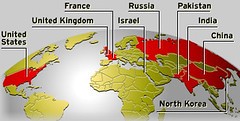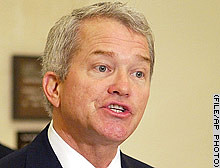After taking a week off from posting in order to attend to some tight deadlines and to our daughter's health (she's doing great at home, btw), it was no surprise to find that the hot topic of the day is North Korea and nuclear testing.
Beyond global diplomacy and potential implications, which appear obvious to us, North Korea has challenged the world in the ultimate high stakes game of communication. From the North Korean government's perspective, it has obviously decided to wager its survival as a closed, tyrannical state against its desire to become an independent and autonamous world player, answerable to no one, much like it perceives China, Russia, and the United States as answerable to no one. Its communication in the last 24 hours was unmistakably premeditated, deviously calculated, and a grave mistake that will have consequences well beyond its borders.
Announcing the test, void of any details, was strategically designed to keep the world guessing whether North Korea is scientifically capable of producing weapon-grade nuclear armaments while stating, unequivocally, that it would no longer answer to anyone, not even the Chinese, who have until recently remained sympathetic to North Korea's direction as a communist country.
President's Bush's response was equally and purposefully vague with ample foreshadow. He said “This was confirmed this morning in conversations I had with leaders of China and South Korea, Russia and Japan. We reaffirmed our commitment to a nuclear-free Korean Peninsula. And all of us agreed that the proclaimed actions taken by North Korea are unacceptable and deserve an immediate response by the United Nations Security Council."
Message: We are not alone in this, which explains why US Ambassador John Bolton presented 13 elements of a punitive resolution condemning N. Korea’s nuclear weapons test to the UN Security Council. The resolution includes inspections of all inbound and outbound cargo from North Korea.
"The North Korean regime remains one of the world's leading proliferators of missile technology, including transfers to Iran and Syria."
Message: We know Syria and Iran seem to be moving closer to what they perceive as a justified a preemptive strike against Israel. Any aid in such a strike, in particular nuclear weapons, could potentially move them to the front of the list.
"The transfer of nuclear weapons or material by North Korea to states or non-state entities would be considered a grave threat to the United States, and we would hold North Korea fully accountable for the consequences of such action. The United States remains committed to diplomacy. And we will continue to protect ourselves and our interests."
Message: We prefer to delay action at the moment, but if you continue to cross every line we have drawn, which further aggravates more pressing interests, we will aggressively pursue de-nuclearization of North Korea by any means necessary.
In the days and weeks and months ahead, it will often be the communication of the message, and not always the action, that will ultimately determine the outcome not just in North Korea, but also the rest of the world. If any US action appears weak, it will only encourage countries like Iran and Syria to step up their own nuclear proliferation programs as such rougue states continue to establish loose alliances out of paranoia, desperation, or perceived opportunity.
Why else would a South American leader choose now to suddenly have a strong opinion of Bush, if not to suggest he sees the potential for or even actively seeks common ground with the Middle East?





















